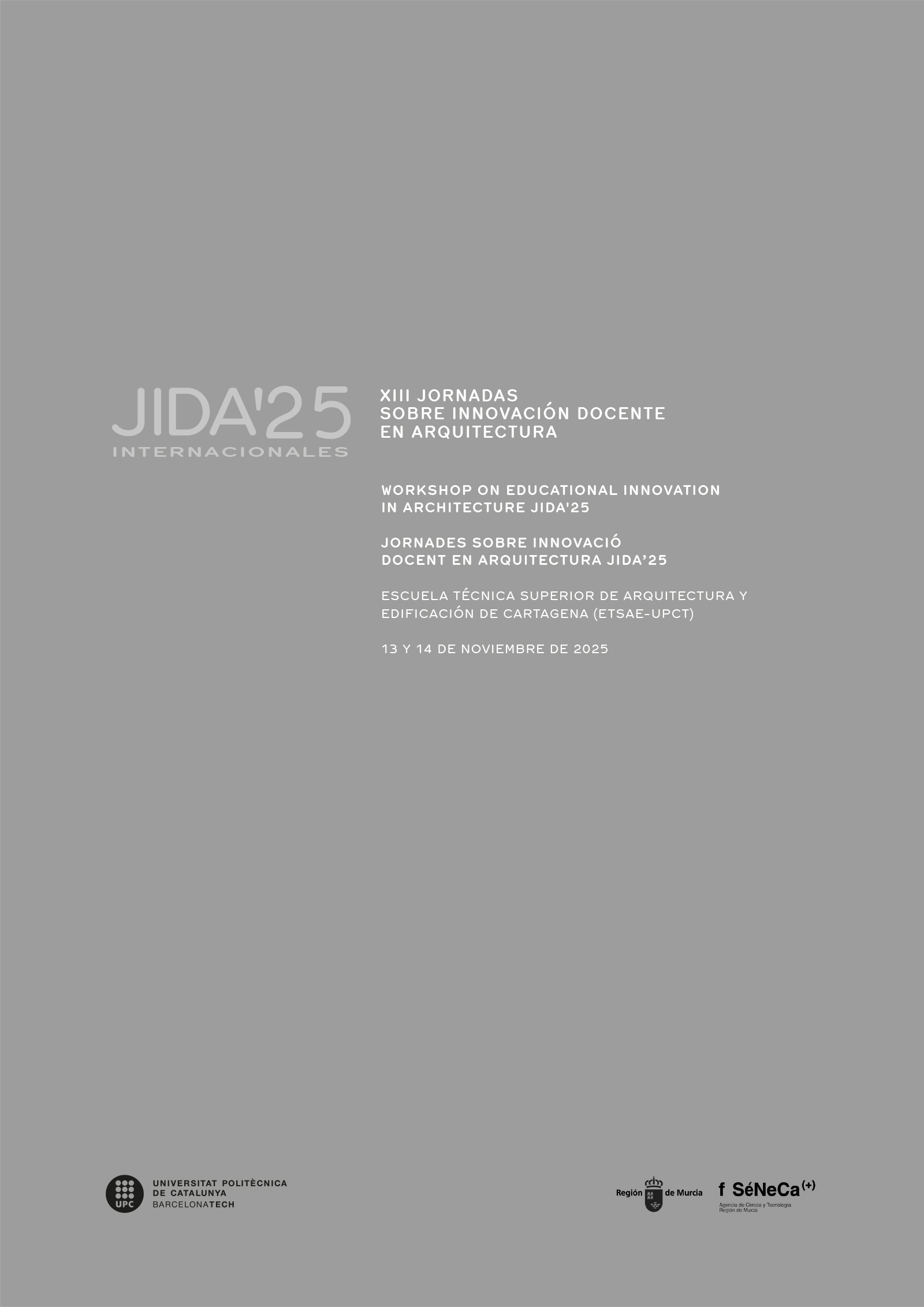The Waterfront as a framework for cross-curricular learning at the service of society
DOI:
https://doi.org/10.5821/jida.2025.13669Keywords:
cross-disciplinary studio, architectural projects, teaching innovationAbstract
This paper presents a teaching experience developed in the fifth-year Studio of the Architecture degree, integrating the fields of architectural design and construction. At Studio III, the waterfront is introduced as an urban context sensitive to water, where students research issues such as mobility, cruise tourism, and the climate emergency. Within this framework, infrastructures are redefined and adapted to urban public spaces in response to new climate scenarios, while the adaptive reuse of heritage is explored in transforming post-industrial sites. This context provides students with the opportunity to confront complex challenges, where research becomes a central component. The studio adopts the pedagogical model of architectural design education grounded in Research by Design (RbD). This framework structures reflective, critical, and creative learning processes, fostering collaborative and cooperative approaches while strengthening the linkage between academic training and professional practice.
References
Aalto, Alvar. 1947. «Architettura e arte concreta». Domus, 225.
Alemany, Joan. 2006. «Rehabilitar, Reconvertir, Revitalizar pero Mantener el Puerto en la Ciudad». Neutra, 14, 22–25.
Alemany, Joan, Bruttomesso, Rinio. 2011. The Port City of the XXIst Century. New Challenges in the Relationship between Port and City; RETE: Venice, Italy.
Andrade, Maria Jose, Costa, Joao Pedro. 2020. «Touristification of European Port-Cities: Impacts on Local Populations and Cultural Heritage». European Port Cities in Transition, editado por Carpenter, Angela, Lozano, Rodrigo, 187-204. Switzerland: Springer.
Andrade, Maria Jose, Costa, Joao Pedro, Blasco López, Jose. 2020. «3DPortCityMeasure: Methodology for the Comparative Study of Good Practices in Port–City Integration». Sustainability, 12, 880. https://doi.org/10.3390/su12030880
Andrade, Maria Jose, Costa, Joao Pedro, Jiménez-Morales, Eduardo. 2021. «Challenges for European Tourist-City-Ports: Strategies for a Sustainable Coexistence in the Cruise Post-COVID Context». Land, 10, 1269. https://doi.org/10.3390/land10111269
Andrade, Maria Jose, Costa, Joao Pedro, Jiménez-Morales, Eduardo, Ruiz-Jaramillo, Jonathan. 2021. «A City Profile of Malaga: The Role of the Port-City Border throughout Historical Transformations». Urban Planning, 6(3), 105-118. https://doi.org/10.17645/up.v6i3.4189
Añibarro, Maria Victoria, Andrade, Maria Jose, Jiménez-Morales, Eduardo. 2023. «A Multicriteria Approach to Adaptive Reuse of Industrial Heritage: Case Studies of Riverside Power Plants». Land, 12, 314. https://doi.org/10.3390/land12020314
Bruttomesso, Rinio. 2001. «Complexity on the urban waterfronts». Waterfronts in Post-Industrial Cities, editado por Marshall, Richard, 39–49. London, UK: Spon Press.
Cross, Nigel. 2006. Designerly Ways of Knowing. London: Springer.
Dal Cin, Francesca, Hooimeijer, Fransje, Matos Silva, Maria. 2021. «Planning the Urban Waterfront Transformation, from Infrastructures to Public Space Design in a Sea-Level Rise Scenario: The European Union Prize for Contemporary Architecture Case». Water, 13, 218. https://doi.org/10.3390/w13020218
Diedrich, Lisa, Janches, Flavio. 2016. «Critical urbanities: Water cities –marginal cities. Striving for integration through a research–based design pedagogy». The 9th International Conference of the International Forum on Urbanism (IFoU): From Knowledge to Development: New university challenges for a contemporary urban development. Buenos Aires.
Gravagnuolo, Antonia, Fusco Girard, Luigi, Ost, Christian, Saleh, Ruba. 2017. «Evaluation criteria for a circular adaptive reuse of cultural heritage». BDC Boll. Del Cent. Calza Bini,17, 185–216.
Gómez Díaz, Francisco. 2016. Proyecto Docente para Concurso Provisión de Plaza de Profesor Titular de Universidad. Universidad de Sevilla.
Hein, Carola. 2021. «Port City Porosity: Boundaries, Flows, and Territories». Urban Planning, 6(3), 1-9. doi: https://www.cogitatiopress.com/urbanplanning/article/view/4663/
Jarauta, Francisco. 2013. Desafíos de la Universidad ante escenarios futuros. Universidad de Murcia. https://www.youtube.com/watch?v=0RiWpfdW1ME
Misirlisoy, Damla, Gunce, Kagan. 2016. «Adaptive reuse strategies for heritage buildings: A holistic approach». Sustain. Cities Soc. 26, 91–98. [CrossRef]
Piñón, Helio. 2006. El proyecto como (re)construcción. Barcelona: Edicions UPC.
Ponz Tienda, Jose Luis. 2013. Proyecto Docente. ETSA Universidad Politécnica de Valencia.
Pujol, Jaime, Fons, Jose Luis. 1981. Los métodos en la enseñanza universitaria. Pamplona: Eunsa.
Rittel, Horst, Webber, Melvin. 1977. Dilemmas in a general theory of planning. Stuttgart: IGP.
Schön, Donald.1983. The Reflective Practitioner. How Professionals Think in Action. London: Temple Smith.






















